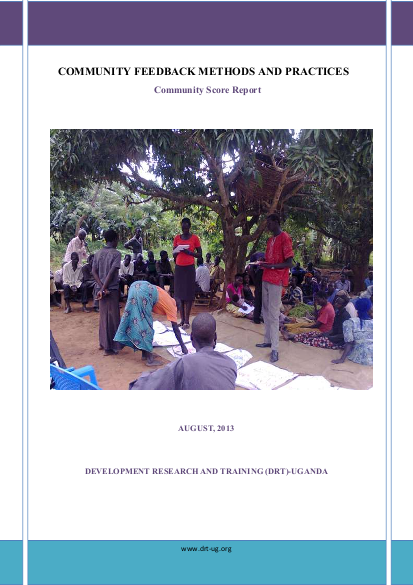
Since 2011, Development Research and Training (DRT) Uganda in partnership with Development Initiatives (DI) UK have been implementing a DFID funded Project under the Programme Partnership Arrangement (PPA). The project covers five districts of Kitgum, Gulu, Pader in Northern Uganda and, Kotido and Katakwi in the North Eastern. The main objective of the project is to increase access and use of information for effective resource allocation among government and donors. This is being done through building the capacity of the communities, local leaders, government and NGOs to influence financial resource allocation through improved information access and use. Information sharing also involves communities giving feedback on issues affecting them. The project assumes that if feedback is channelled to the relevant authority, it will facilitate decision-making and result into improved service delivery for poverty reduction and humanitarian response. This report therefore aims at documenting and sharing findings on the feedback methods and practices used by communities, government and development partners to access information and provide feedback. It also aims at informing government and other humanitarian agencies on which methods and practices work for communities.
In March, 2012, DRT carried out a survey to identify feedback methods and practices used among communities, government and development actors. Ten feedback methods and practices were identified. The community together with DRT later identified and trained 5 community members in each district to act as community resource trackers. These were later given simple resource tracking tools to facilitate data and feedback gathering in their communities. The process involved following up with relevant local leaders and also providing feedback to relevant structures. During this period, subsequent follow up have been made to support the trackers in their work. This report is based on the scoring activities of the communities carried out from the 12th-16th August, 2013. Through further dissemination and discussions with development stakeholders and government, the report will attempt to identify and provide partners with ‘best practice’ feedback methods.